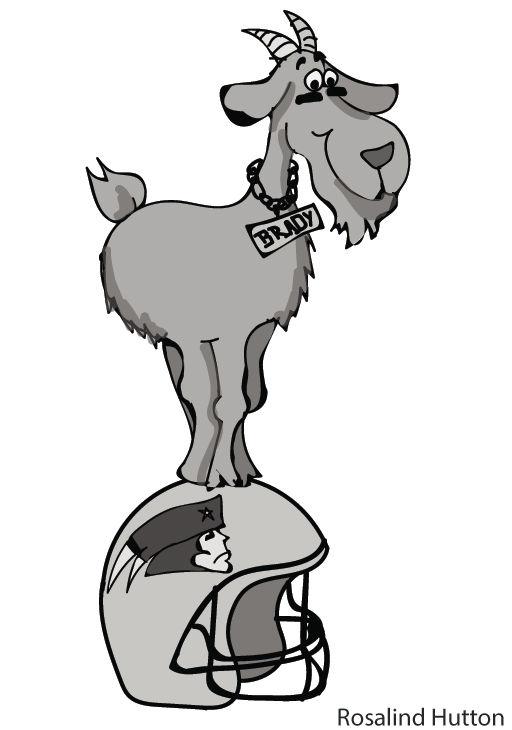Unlike any other position in professional sports, the quarterback position in professional football is truly the face of his team, franchise and league. No position in sports decides more wins and losses than the quarterback; therefore, deciding who is the greatest of all time, or the G.O.A.T. for short, always sparks a heated debate.
Everyone has an opinion and there is almost no wrong answer when discussing true greatness, but in my humble opinion, one man stands head and shoulders above the field: Tom Brady.
To be fair, there are plenty of other quarterbacks in the running who have legitimate arguments for the title of G.O.A.T. Brett Favre, Peyton Manning and Drew Brees, all retired or are going to retire, with many of the major passing records, such as passing yards, touchdowns, completions and many others.
However, all of their Super Bowl victories combined amount to the number Tom Brady has alone: six. Terry Bradshaw won four super bowls, Bart Starr won five NFL Championships overall and Otto Graham went to 10 straight championship games in his 10-year career and won seven of them. Nonetheless, they all played in heavy run-based schemes which limited their passing and impact on the game. Unlike everyone else, Brady has the wins and the statistics to make his case for greatness.
In most people’s eyes, there is only one man who can truly compete with Brady: Joe Montana. Montana was the quarterback of the San Francisco 49ers from 1979-1992 and won four Super Bowls in 10 years from 1981-1990.
For decades, Montana was considered the G.O.A.T. by most, and it is easy to see why. Not only did he win four Super Bowls, only the second man ever to do so after Terry Bradshaw, but he did so while revolutionizing the sport.
Under head coach Bill Walsh, Montana ran the “West Coast System” which, according to Alen Dumonjic of Bleacher Report, “was [an offense] that relied heavily on a method, ball-control passing game that utilized the backs and tight ends as primary receivers.”
This new offensive mentality changed the game forever as we still see Walsh’s system used in many of today’s offenses, but no one runs it as effectively as Montana. Montana retired as the game’s highest-rated passer, and was elected to eight Pro Bowls, five All Pro Teams, won two NFL MVP awards and was a member of the NFL’s All Decade team of the 1980’s and the NFL’s 75th anniversary all time team in 1994. Most importantly, though, Montana was known for his wins.
Montana went undefeated in Super Bowls, winning all four of his appearances. According to Larry Schwartz of ESPN, he won three Super Bowl MVP awards and “completed 68% of his passes for 1,142 yards with 11 touchdowns and no interceptions; his quarterback rating was 127.8 (out of 158.3).”
Under Montana, the 49ers won over 71 percent of their games and were among the greatest teams ever assembled. There is a reason why Montana was considered the G.O.A.T. for many decades before Brady started playing. The argument is still there to be made, but there is one fact that puts Brady over the top: the salary cap.
As defined by John Perritano of Howstuffworks.com, the salary cap “refers to a set amount of money that each of the NFL’s 32 teams is allowed to spend on players’ salaries for any giver league year.”
The cap was institutionalized in 1994, and since then, it has caused major ramification on the NFL. Unlike before, teams could no longer hoard talent to build dynasties. Players had become more valuable, and with a restriction on the amount teams could spend, hard decisions had to be made by owners and coaches. It is for this very reason we see so many turnovers on each NFL team every offseason. Unlike Montana, Brady’s roster could not consistently be filled with great players and hall-of-famers every season in order to continue their dynasty.
While Montana won Super Bowls with great players and hall-of-famers such as Jerry Rice, Roger Craig, Ronnie Lott, John Taylor and Tom Rathman, Brady just made it to his record-breaking ninth Super Bowl with only one other Pro Bowler beside himself.
Montana won three Super Bowls throwing to Jerry Rice, a man who is largely considered the greatest wide receiver of all time and who has the most catches, yards and touchdowns of any player in history. On the other hand, Brady had one Pro Bowl receiver in his first three Super Bowl victories from 2001-2004. Brady simply had to do more with less, and Brady sure did a lot with such marginal talent.
In every conceivable way, Brady is the G.O.A.T. He has the wins, the stats and he has done it all while managing the salary cap, something no other G.O.A.T. before his time had to handle. To make matters worse for the rest of the NFL, Brady is not finished yet.
















































































